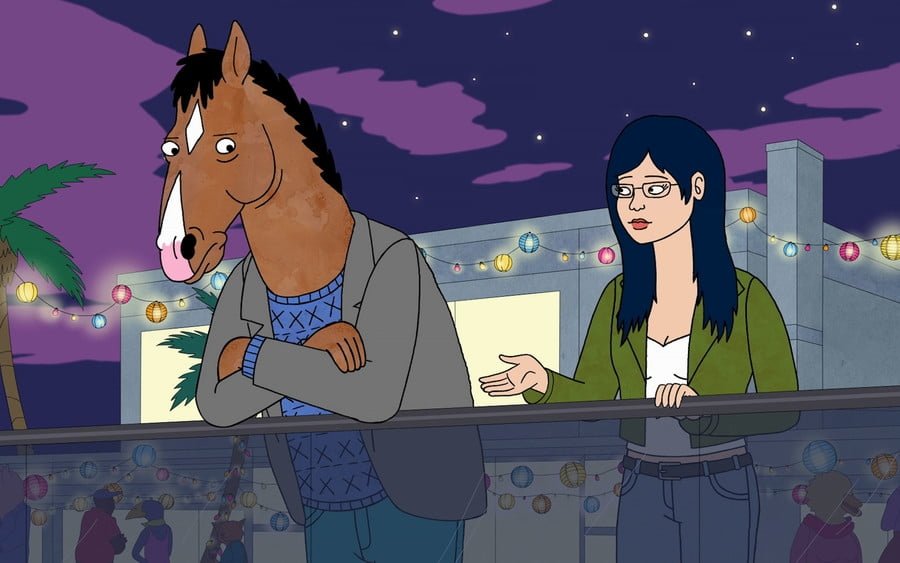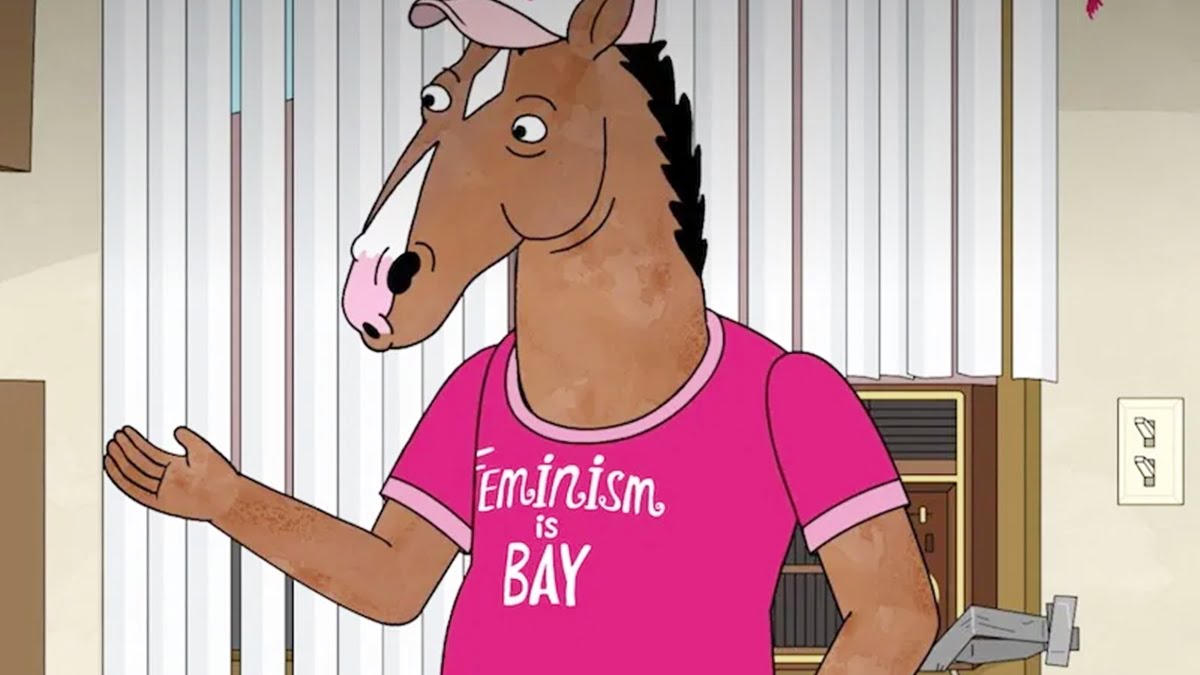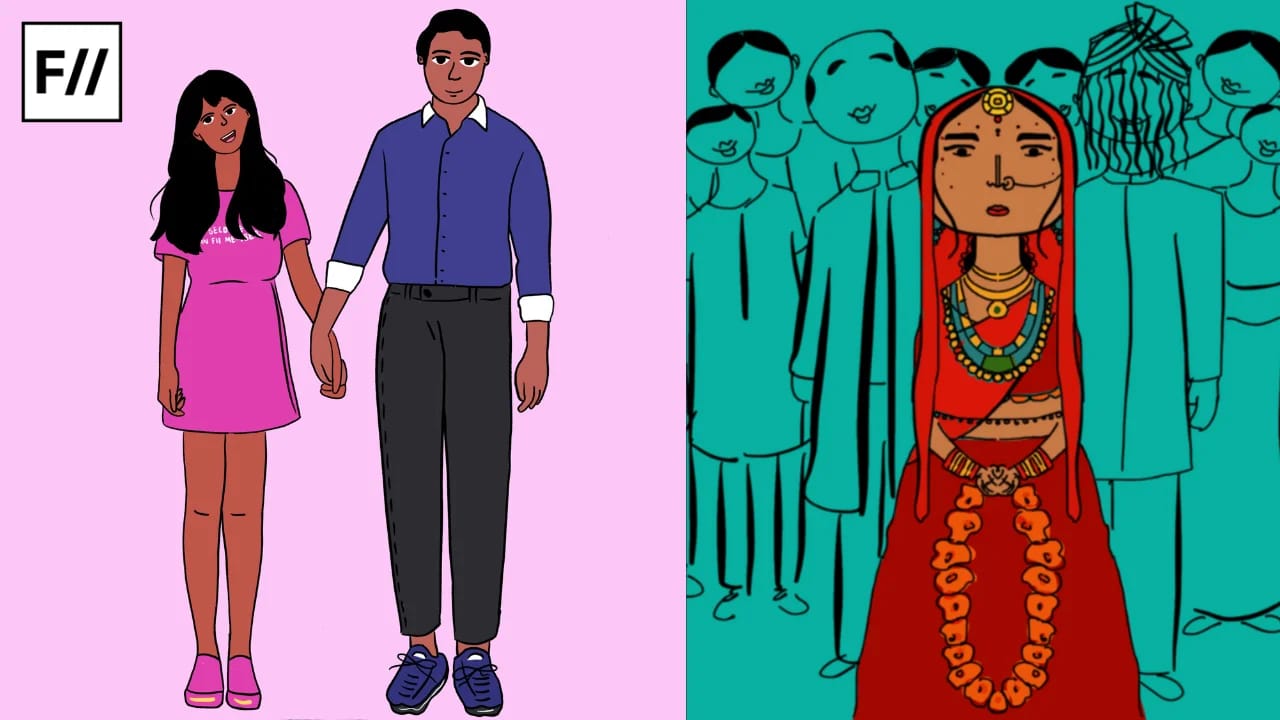BoJack Horseman, a popular series on Netflix, is the story of an horse anthropomorphised as a Hollywood actor who starred in a famous sitcom in the 90s and is now nearing the end of his career. It explores themes of broken households, Post-Traumatic Stress Disorder (PTSD), self-destructive behaviour, and personal fears of loss, failure, addiction, and alcohol abuse. The show also touches upon the contemporary debates around the #Metoo movement, gun control laws and opioid crisis in a remarkable manner. This essay attempts to analyse the narratives around mental health and feminism that have been touched upon in the series.
The names of episodes such as “The Face of Depression”,” Still Broken”, “Nice While it Lasted” and “A Horse Walks into Rehab” to name a few depict the writer’s intention to remind the audience that the show is not just a comedy, but rather a mirror to society. The problems of the characters are not glamorised or romanticised. These characters are shown struggling, making mistakes and living with their consequences.
There is a ubiquitous influence of trauma on the characters in BoJack Horseman, the only difference being the ways they deal with it. BoJack uses his past experiences as a barrier for his growth, his perennial negativity for his environment and apathy for social relations are shown as direct consequences of his broken childhood. Others such as Princess Carolyn seek closure in not repeating those mistakes, being ill-treated as an intern and inferior at Vigor, she opens her own company, providing an equal footing to all employees. Another character, Diane, seeks to have a more open and honest relationship with her next fiance Guy, something that her interactions with Mr. Peanut Butter lacked, whose optimistic personality refrained Diane from talking about her daily struggle with neurosis.
Also read: 3 Animated Comedy Series For Women To Truly Enjoy
The reason why BoJack Horseman becomes so comforting for most adults is due to its straightforwardness. Unlike movies such as Zootopia where discrimination in the workplace is only labelled as unfair, and the source of the disparity lying in patriarchy is not tackled with. BoJack Horseman is a social commentary, often naming its episodes on the basis of the problem it seeks to showcase. One such theme is feminism.

The reason why BoJack Horseman becomes so comforting for most adults is due to its straightforwardness. Unlike movies such as Zootopia where discrimination in the workplace is only labelled as unfair, and the source of the disparity lying in patriarchy is not tackled with. BoJack Horseman on the other hand is a social commentary, often naming its episodes on the basis of the problem it seeks to showcase. One such theme is feminism. In fact, feminism is a topic that runs throughout the series in an inconspicuous manner, until the fifth season.
Though there are many important female characters to the show, here we discuss Diane, Princess Carolyn, and Gina. When we first encounter Diane we are aware that she is bound to be BoJack’s love interest, and if that fails, a lost love. However, we see many more facets of her life unfolding throughout the series – dealing with depression, a failed marriage, and the fear of not being a ‘good feminist’. Princess Carolyn, BoJack’s ex-lover and current manager is a workaholic and is struggling between being more successful, her impoverished childhood being a constant reminder, and her deepest desire of having a family to fulfill her life. It is interesting how Raphael Bob-Waksberg, the director, introduces the female characters into the mainstream as BoJack’s love interest, but later delves into different aspects to their characters through the themes of feminism and the transitory careers of female actresses, single motherhood and abortions.
In an episode titled Ruthie, Princess Carolyn suffers from a miscarriage, she breaks up with her boyfriend after realising that she doesn’t picture herself with someone but only sees her granddaughter in the future, turning to single motherhood.This is shown as the point where she drifts away from the pressure to fulfill her role of a woman; a wife, mother and homemaker. She now chooses to adopt a daughter and employs Todd as a nanny to look after her daughter while she works. She becomes her own boss and prioritises her needs. However, she finds it difficult to find a surrogate parent as people are apprehensive of single mothers, especially working women, even though the large part of raising the child is singularly the duty of the woman. Thus, BoJack Horseman touches several topics of relevance in the contemporary feminist movement – be it surrogacy, abortions, single motherhood, etc.
Also read: Why Is There A Lack of Asexual Representation In Indian Media?
BoJack Horseman touches several topics of relevance in the contemporary feminist movement – be it surrogacy, abortions, single motherhood, etc.
Gina is BoJack’s girlfriend and co-actor for the show Philbert in season 5. In an episode, BoJack is heavily overdosed on painkillers and accidentally assaults Gina. When this becomes the big headlines and Gina gets the popularity she always wanted, she refused BoJack from acknowledging that the assault occurred as she didn’t want to be known as “that girl” who got assaulted by a big TV star. Similarly, Princess Carolyn agrees to hire Vance Wagner, a sexist and anti-Semitic as the lead villain in Philbert because even if she dislikes him, she has to run the business. These segments in the show shines light upon how implementing feminist ideals in real life is practically difficult, considering how moral correctedness could sometimes impinge on say, the survival or other aspirations of the women.
At the same time, BoJack Horseman ensures that the series do not show the ideology in a demeaning manner. The series attempts to seek more representation in the way women practice it. They emphasise on how women choose to create their own forms of emancipation. This in turn, focuses the attention on the root cause of these issues, that is society. Further, in a BoJack Horseman episode, an episode titled BoJack the Feminist puts feminism at centrestage and talks about a phenomenon that has become a popular trope these days; performative woke-ness or as some would say virtue signalling. In the episode, after he accidentally speaks out against the sexist villain Vance Waggoner, he garners a positive response from feminist organisations and social groups, leading BoJack, Diane, and Princess Carolyn to realise that showcasing BoJack as a feminist would be mutually beneficial. This, considering how BoJack would earn more audience and Diane, who is aware that people listen to men over women, sees it as an opportunity to forward the beliefs of the movement. It is ironic to see how to see the two women train a man to be the symbolic representation of an ideology that seeks to empower women.
In a BoJack Horseman episode, an episode titled BoJack the Feminist puts feminism at centrestage and talks about a phenomenon that has become a popular trope these days; performative woke-ness or as some would say virtue signalling.
What is also important to note here is how BoJack Horseman continues to make blockbuster films despite his casual sexism and irresponsible behaviour. On the other hand when Kelsey Jannings, an award-winning director who gets an offer to direct a commercial film with BoJack Horseman acting in it, she sticks to the rules. She consciously checks the film sets, showcasing her constant efforts to not lose this opportunity. BoJack, who has never come across a person who is not appeased by his demeanor, keeps trying to get her attention. In an episode titled The Shot, BoJack convinces Kelsey to reject the producers’ advice to not shoot a scene. BoJack, who is extremely passionate about the character, convinces Kelsey it is essential that the scene be filmed; they break into the Nixon Museum and get the shot. The next day when BoJack comes to set, he is told that Kelsey was fired for not following orders and has been replaced by another director while BoJack, who was equally involved in the act, remains unscathed. This is a critique of how society expects accountability differently from a woman and a man.
There is no right or wrong in humans nor their decisions black or white, which shows such as BoJack Horseman guides us into realising. At the same time, it does not anywhere suggest that for these mistakes and failures one gets off easy on a free pass. Instead, our actions come with consequences.
Maitreyi is a second year student at Delhi University studying History. She is an interactional feminist and passionately explores theme in socio – political movements and cinema focused on bildungsroman genre. She can be found on Twitter and Instagram.
Featured Image Source: Femestella





You have explained about mental health that is as important as physical health. I like the topic that you chose. Well articulated!
There are thousands of people who feel we have already arrived at equality for men and women.”Feminism” is only a word .We all women have faced discrimination and we know it that it still exist in society.
A lucid, detailed and engaging article written by a young feminist! The basic pillars of feminism are explained with anecdotes from series of Netflix BoJack Horseman which makes an article more appealing to audience. Waiting for your book to come. All the best Maitreyi!